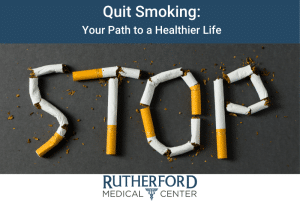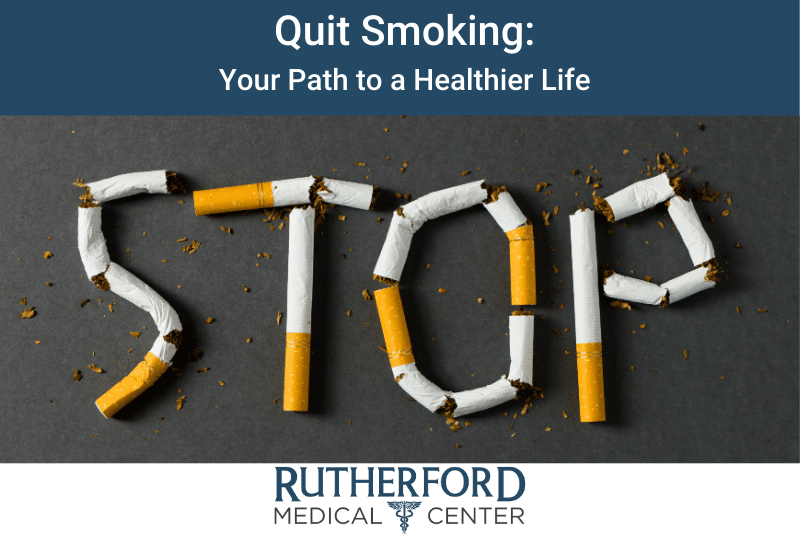October 1, 2025
 Smoking is a habit that affects millions worldwide, yet many individuals struggle to break free from nicotine addiction. At Rutherford Medical Center, we understand the challenges associated with quitting smoking and are dedicated to supporting individuals on their journey to better health. Quitting smoking is one of the most impactful decisions you can make to improve your overall well-being and extend your life expectancy.
Smoking is a habit that affects millions worldwide, yet many individuals struggle to break free from nicotine addiction. At Rutherford Medical Center, we understand the challenges associated with quitting smoking and are dedicated to supporting individuals on their journey to better health. Quitting smoking is one of the most impactful decisions you can make to improve your overall well-being and extend your life expectancy.
In this blog, we’ll explore why quitting smoking is essential, the benefits of doing so, and how Rutherford Medical Center can assist you in your journey to becoming smoke-free.
Why Is Quitting Smoking Important?
Smoking is responsible for numerous health complications, ranging from respiratory issues to life-threatening diseases. Here are just a few reasons why quitting smoking should be a top priority:
- Reduced Risk of Chronic Diseases: Smoking is a leading cause of heart disease, stroke, and lung cancer. Quitting can significantly lower your risk of developing these conditions.
- Improved Lung Health: After quitting, your lungs begin to heal, reducing your chances of chronic obstructive pulmonary disease (COPD) and other respiratory issues.
- Better Circulation: Smoking damages blood vessels, leading to poor circulation. By quitting, you’ll improve your cardiovascular health and reduce your risk of blood clots.
- Stronger Immune System: Smoking weakens the immune system, making you more susceptible to infections. Once you quit, your immune system will function more efficiently, protecting you from illnesses.
- Increased Life Expectancy: Studies show that quitting smoking, even later in life, can significantly increase life expectancy. Your body begins to heal almost immediately after you quit.
Benefits of Quitting Smoking
Quitting smoking offers both short-term and long-term benefits, many of which you’ll begin to notice within days of your last cigarette.
Short-Term Benefits:
- Improved Taste and Smell: Your senses of taste and smell return within days of quitting, enhancing your enjoyment of food and life’s pleasures.
- Better Breathing: Your lung function will improve, making it easier to breathe and engage in physical activity.
- Increased Energy: Without the toxins from cigarettes, your body will have more oxygen, leading to higher energy levels and less fatigue.
- Reduced Stress: While nicotine is often used as a stress reliever, quitting actually decreases overall stress and anxiety as your body adjusts to being nicotine-free.
Long-Term Benefits:
- Lower Cancer Risk: Quitting smoking significantly reduces your risk of lung, mouth, throat, bladder, and pancreatic cancers.
- Cardiovascular Health: The risk of heart disease decreases by half after one year of quitting, and in 10 years, it’s the same as that of a non-smoker.
- Better Quality of Life: With fewer illnesses and improved physical health, you can enjoy life more fully, participate in activities, and spend more time with loved ones.
How Rutherford Medical Center Can Help
Quitting smoking isn’t easy, but with the right support and tools, it is achievable. Rutherford Medical Center offers a comprehensive quit-smoking program tailored to individual needs. Our experienced healthcare professionals provide personalized guidance and resources to help you succeed.
Services Offered:
- Counseling and Support Groups: We offer one-on-one counseling and group sessions to provide emotional support and coping strategies for managing withdrawal symptoms.
- Nicotine Replacement Therapy (NRT): Our team can recommend appropriate nicotine replacement products like patches, gums, or lozenges to help reduce cravings.
- Prescription Medications: Certain medications can help reduce withdrawal symptoms and cravings. We will assess your needs and prescribe the right medication if necessary.
- Behavioral Therapy: Smoking is not just a physical addiction but also a psychological one. Our behavioral therapy sessions can help you identify triggers and develop healthier coping mechanisms.
- Follow-Up Care: Quitting smoking is a long-term process, and we are here to provide continued support through regular follow-ups and ongoing encouragement.
Q&A: Common Questions About Quitting Smoking
Q: How long does it take to quit smoking?
A: The timeline for quitting varies from person to person. For most, physical withdrawal symptoms peak within the first week and subside after two to four weeks. However, the psychological aspect of quitting can take months or even years. The key is persistence and seeking support when needed.
Q: What are withdrawal symptoms, and how can I manage them?
A: Withdrawal symptoms may include irritability, cravings, difficulty concentrating, anxiety, and changes in sleep patterns. These symptoms typically last for a few weeks but can be managed with strategies like nicotine replacement therapy, deep breathing exercises, and distractions such as hobbies or physical activities.
Q: Will I gain weight after I quit smoking?
A: Some people do gain a small amount of weight after quitting due to an increase in appetite. However, adopting healthy eating habits and regular physical activity can prevent significant weight gain. It’s important to focus on your overall health, as the benefits of quitting far outweigh any temporary weight fluctuations.
Q: How can I avoid relapse?
A: Avoiding relapse requires identifying triggers that make you want to smoke and developing coping mechanisms. Stay connected with support groups, continue therapy if needed, and remember that a lapse doesn’t mean failure. If you slip up, get back on track as soon as possible.
Q: Can I quit smoking if I’ve been smoking for decades?
A: Absolutely. It’s never too late to quit. Your body begins to repair itself almost immediately after you stop smoking, regardless of how long you’ve smoked. People who quit later in life still see significant health improvements.
Q: Can e-cigarettes help me quit smoking?
A: While some people use e-cigarettes to transition away from traditional cigarettes, they are not an FDA-approved method for smoking cessation. If you’re interested in using e-cigarettes as part of your quit plan, it’s important to discuss it with a healthcare provider to ensure it’s a safe and effective option for you.
Contact Rutherford Medical Center
If you’re ready to quit smoking or have questions about our smoking cessation program, Rutherford Medical Center is here to help. Contact us today to schedule a consultation or learn more about our services.
Rutherford Medical Center
12755 Century Dr, Suite A
Start your journey to a healthier, smoke-free life today! Quitting smoking is one of the most important steps you can take for your health, and Rutherford Medical Center is committed to helping you succeed.
